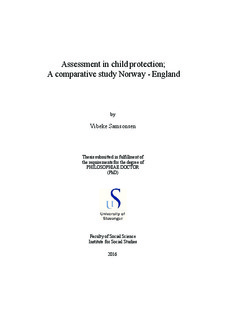| dc.description.abstract | Aims: The overall aim of this thesis was to explore the phenomenon of
assessment in child protection by comparing two different assessment
practices, the Norwegian and the English. Additional aims have been to
generate knowledge by interpreting findings from the perspectives of
professionals and parents who have experienced assessment, and to contribute
to identify central aspects of the use of professional judgement in child
protection assessments. The guiding research questions throughout this thesis
have been: what mechanisms are at play in assessments in the two contexts,
and what seem to constrain and support fruitful assessment practices?
Additionally, what can we learn from each other (Norway-England) in terms
of such practices? A “Critical Realist” approach has been applied as an
overarching perspective throughout this thesis.
Methods: The data source for this study consists of interviews with social
workers and parents from Norway (Bergen) and England (Bristol), together
with assessment reports from both countries. This is an in-depth study with a
qualitative approach, including interviews with 14 social workers regarding
their perspectives on practice, analyzed by means of thematic content analysis.
Additionally, 11 interviews with parents were undertaken, who had been
assessed by social workers following child protection concerns, analyzed by
means of thematic narrative approach. Furthermore, a total of 31 assessment
reports (which were not linked to the family cases), were analyzed through
textual content analysis.
Results: When analyzing the professionals` experiences (Paper 1) three main
themes emerged: 1.Assessment framework, 2. Professional judgements, and 3.
Contextual factors. The main findings show that the social workers in Norway
and England experienced their respective assessment framework quite
differently. Specifically, social workers in Norway presented professional
judgement as a core element of assessing in child protection, but looked for
more structured ways to make good judgements. However, they were
concerned about increases in bureaucracy in the assessment process, resulting
in more paperwork and less time spent with families. The social workers in
England were proud of their “triangle” model for assessment and the general
thoroughness in the system, but they longed for more trust to use professional
judgement in assessment, and more resources to meet the needs of families
after assessment. Differences between the two groups were discussed in the
light of contextual factors, with special focus on the concept of accountability:
How does the government in each country restrict and/or support the
professional judgement of social workers when assessing in child protection?
Differences were found in national accountability approaches, with the English
authorities turning to structural accountability strategies by controlling and
reducing the space for professional judgement through structures and
procedures, and the Norwegian authorities on the other hand using a more
epistemic accountability approach by supporting, rather than restricting, the
room for professional judgements through resources in terms of staff and
education. The parents’ experiences (Paper 2) resulted in two overarching
themes of “emotions” and “power” in assessment practice. When asked about
their opinions of the current assessment framework, families in both countries
talked more about feelings than about framework and procedures. The parents`
experiences of assessment were similar in both countries. First and foremost
they experienced strong emotions in a stressful situation: anxiety, frustration,
powerlessness, but also relief. However some differences were identified in
the way social work is acted out according to the national assessment
framework and policy context. The English framework and procedures seemed
to contribute to provide clarity with regard to process and power within the
system. The Norwegian assessment practice was characterized by professional
judgement accompanied by more resources, which seems to enable helpful
decisions from the family’s point of view. However, this heavy reliance on
professional judgement within relationships was also viewed by parents as
social workers’ having informal power. Paper 3 is a theoretical analysis of the
different characteristics illustrated by Norway and England regarding the role
of professional judgement in child protection assessments. This paper explores
and discusses the different ways in which professional judgement is
understood and addressed in each system. Acknowledging child protection as
a “Wicked problem”(in terms of complexity), a model of Grounded
Professional Judgement is proposed, based on notions of epistemic
responsibility and accountability to support the exercise of professional
judgement in situations of uncertainty. Thismodel occupies a middle position
between those currently reflected in the assessment systems in the English and
Norwegian context. Retaining a commitment to the use of professional
judgements, the model nonetheless provides a structure within which a
judgement can be exercised more rigorously, transparently and in a way that
can be called to account. In this way, Grounded Professional Judgement may
provide a counterbalance to the potential idiosyncrasies of decision making,
and avoids professional judgement being elevated to a point where it is beyond
challenge or critique. At the same time, in systems where the space for
professional judgement has been reduced at the expense of increased procedure
and bureaucracy, it would provide a framework within which professional
judgement can be “reclaimed” by social workers and built back in to practice.
Conclusions: Assessment frameworks in child protection seem to be of
importance for all those involved in assessment practice. Experiences from
Norway and England can be used as illustrations of different stances on a
continuum where different assessment frameworks and practices include
diverse framing of the problems. Heavy reliance on assessment structuresmay
restrict the room for professional judgements (as seen in England), whilst lack
of mandatory assessment structures implies heavy reliance on professional
judgement (as seen in Norway). The pitfalls on both ends of this continuum
imply that a middle-position might be most fruitful in assessment; the main
question is where to find the balance between the two. It also appears fruitful
to support assessments by systemic factors, eg enough resources in terms of
staff, education and interventions, together with constructive public debate.
From the families` point of view, the “right” balance involves clarity of the
assessment process and power issues, and provision of tailored services and
interventions after assessment. | nb_NO |

